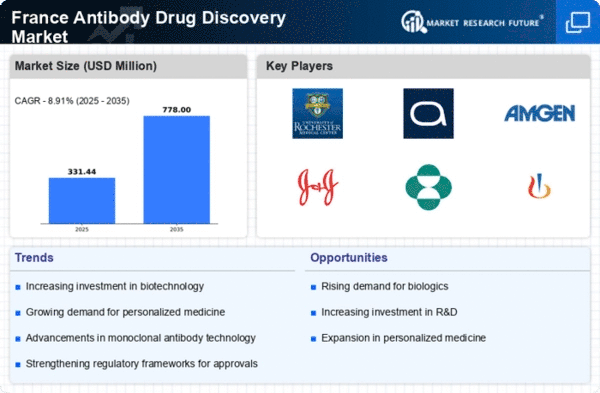Supportive Government Policies
The French government is actively promoting the antibody drug-discovery market through supportive policies and funding initiatives. Programs aimed at fostering innovation in biotechnology and pharmaceuticals are encouraging research institutions and companies to collaborate on new therapeutic developments. In 2025, government funding for biotech research is anticipated to exceed €500 million, which will likely bolster the antibody drug-discovery market. This financial support, combined with favorable regulatory frameworks, is expected to enhance the overall research environment, facilitating the translation of scientific discoveries into viable therapeutic options.
Growing Demand for Targeted Therapies
The antibody drug-discovery market in France is experiencing a notable surge in demand for targeted therapies. This trend is driven by the increasing prevalence of chronic diseases, such as cancer and autoimmune disorders, which require more precise treatment options. In 2025, the market is projected to reach approximately €3 billion, reflecting a compound annual growth rate (CAGR) of around 8%. The focus on developing monoclonal antibodies that specifically target disease mechanisms is reshaping the landscape of treatment protocols. As healthcare providers and patients alike seek more effective and less toxic alternatives to traditional therapies, the antibody drug-discovery market is likely to expand significantly, fostering innovation and investment in this sector.
Rising Patient Awareness and Advocacy
Patient awareness and advocacy for novel therapies are significantly influencing the antibody drug-discovery market. As patients become more informed about their treatment options, there is a growing demand for innovative therapies that offer better outcomes. Advocacy groups in France are actively promoting the benefits of antibody-based treatments, which is likely to increase patient engagement in clinical trials and research initiatives. This heightened awareness is expected to drive market growth, as pharmaceutical companies respond to patient needs by prioritizing the development of effective antibody therapies. In 2025, the impact of patient advocacy on the market is projected to be substantial, potentially leading to a 15% increase in clinical trial participation.
Advancements in Biotechnological Techniques
Recent advancements in biotechnological techniques are playing a crucial role in the evolution of the antibody drug-discovery market. Innovations such as CRISPR gene editing and high-throughput screening are enhancing the efficiency of antibody development processes. These technologies enable researchers in France to identify and optimize therapeutic candidates more rapidly, potentially reducing the time to market. Integrating artificial intelligence in drug discovery is also streamlining the identification of promising antibody candidates. As a result, the market is expected to benefit from increased productivity and reduced costs, which could lead to a more competitive landscape in the coming years.
Increasing Collaboration Between Academia and Industry
Collaboration between academic institutions and industry players is becoming increasingly prevalent in the antibody drug-discovery market. French universities and research centers are forming partnerships with biotechnology firms to leverage their expertise in antibody engineering and development. This synergy is fostering innovation and accelerating the translation of research findings into clinical applications. In 2025, it is estimated that collaborative projects will account for over 30% of new antibody therapies entering clinical trials. Such partnerships not only enhance the research capabilities but also provide access to funding and resources, thereby driving growth in the market.





















Leave a Comment